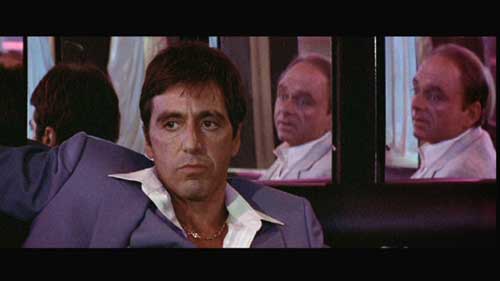 John Kenneth Muir continued his weekly essays about Brian De Palma films last week with a look at Body Double, delving deeply into the issue of mysogyny often leveled at that film. This week, Muir looks at Blow Out-- here is a key excerpt:
John Kenneth Muir continued his weekly essays about Brian De Palma films last week with a look at Body Double, delving deeply into the issue of mysogyny often leveled at that film. This week, Muir looks at Blow Out-- here is a key excerpt: In Blow Out's most ironic and mocking use of iconic American imagery, Jack arrives too late to save Sally from Burke, but De Palma's camera triumphantly spins around the tragic duo nonetheless. As an "average" citizen dies below so the powerful may continue to "serve," in the heavens above fireworks explode with orgasmic glee and abandon.
The illusion of freedom and liberty are alive for all to see in the sky, even if Sally (and the truth...) die right here; their ends acknowledged only by Jack.
Sally's personal story in Blow Out also serves as a metaphor for disillusionment and disenfranchisement in America. Sally begins her journey as a disinterested observer, just minding her own business trying to make a buck any way she can. She doesn't even watch the news "because it is too depressing." When Sally finally does get involved in the "political process," in a quest with Jack to reveal the truth about this conspiracy, what happens? She is brutally murdered.
In this case, a murdered innocent in a movie may very well represent a disappointed, disillusioned electorate in real life. Most people don't get involved in politics, and those activists who do so inevitably face disappointment because things don't seem to change, or get any better. The parties in power may alternate, but the entrenched interests don't. Killing Sally in Blow Out is, essentially, killing hope in the democratic process; it's killing political involvement. From a certain perspective, there are no real "good guys" in Blow Out because even the guy in "search of the truth," -- Jack himself -- exploits the simple-minded Sally (representing the American electorate) for his own purpose. He ruthlessly uses her for his ideological agenda...and she ends up dead, even though that agenda was inarguably noble.






 A digital version of Brian De Palma's Scarface was released in U.K. cinemas this weekend. A couple of U.K. critics had some interesting takes on the rerelease, with one suggesting that Scarface is the "definitive" film of the '80s, while the other finds tongue-in-cheek relevence to the current political atmosphere.
A digital version of Brian De Palma's Scarface was released in U.K. cinemas this weekend. A couple of U.K. critics had some interesting takes on the rerelease, with one suggesting that Scarface is the "definitive" film of the '80s, while the other finds tongue-in-cheek relevence to the current political atmosphere.


